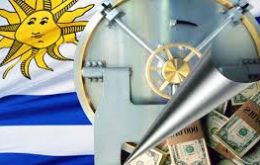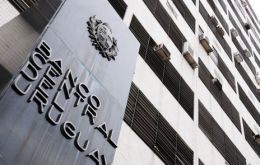MercoPress. South Atlantic News Agency
Tag: Central Bank of Uruguay
-
Friday, August 5th 2016 - 12:18 UTC
Moody's lowers Uruguay's banking system outlook to negative: inflation remains main challenge

Moody's has lowered its outlook on Uruguay's (Baa2 negative) banking system to negative from stable on the expectation that asset risks will rise moderately as challenging economic conditions weigh on consumers and businesses alike, and profitability will decline.
-
Wednesday, September 23rd 2015 - 07:17 UTC
Uruguay pumps greenbacks to keep the US dollar rate on sliding stability

Uruguay's central bank was forced to sell almost 65 million dollars on Tuesday, the highest volume so far this year, to keep the US dollar from ballooning as fears of the collapse of the Brazilian economy are felt through the region. The dollar finally ended trading with a slight 0.12% increase at 28,826 Pesos to the greenback.
-
Thursday, May 7th 2015 - 06:01 UTC
Uruguay's economy 'strong enough' to navigate in challenging environments

Uruguay's economy is “strong enough to navigate in a challenging global and regional environment” in which the U.S. dollar is strong and inflation is starting to rise, Uruguayan Central Bank, (BCU), chairman Mario Bergara said during a conference in Montevideo where he discussed the central bank's mission in the current world environment.
-
Thursday, October 2nd 2014 - 07:06 UTC
Uruguay's fiscal deficit 'relatively' stable at 3.3% of GDP

Uruguay's fiscal deficit in the twelve months to August was equivalent to 3.3% of GDP, or 1.725bn dollars according to the latest release from the Economy and Finance ministry. However the primary deficit (before debt payments) was 202 million dollars or 0.39% of GDP.
-
Tuesday, September 16th 2014 - 05:25 UTC
Uruguay's economy expands 3.7% during the second quarter over a year ago

Confirming ten years of sustained expansion the Uruguayan economy advanced 2% in the second quarter over the first quarter and 3.7% over the same period a year ago, according to the latest reports from the Central bank.
-
Friday, July 11th 2014 - 01:37 UTC
Uruguay central bank admits inflation remains the main concern and pledges monetary contraction

Uruguay's Central bank confirmed that inflation remains the leading challenge and ratified the current monetary contractive policy with the M1 money supply index converging to 8% from its current 10.4%, in a 'not too distant horizon'.
-
Saturday, July 5th 2014 - 09:13 UTC
Uruguay's inflation index for June slightly down: 9.08% in twelve months

Uruguay's inflation index experienced a slight deceleration during the twelve months to June, from 9.18% in May to 9.08%, basically because of cheaper fresh food, frozen public utility rates including fuel, while a stabilized exchange rate for the US dollar with a strong Peso, helped with imported goods.
-
Wednesday, June 18th 2014 - 08:31 UTC
Uruguay economy growing at a slower pace: imports up; exports stagnant

Uruguay's economy expanded 2.4% in the first quarter compared with the same 2013 period, but contracted 0.4% compared with the fourth quarter of last year, the central bank said this week. However deceleration is a fact since growth of the first quarter in 2013 has gone up 4.6% over 2012.
-
Wednesday, June 11th 2014 - 01:48 UTC
Uruguay issues 2 billion dollars of new 2050 global bond to help spread the country's debt

Uruguay issued 2 billion dollars of a new 2050 global bond on Tuesday at a spread of 165 to 170 basis points over U.S. Treasuries as part of the government's bid to put less strain on its accounts in the near- and medium-term, it was reported.
-
Monday, March 31st 2014 - 19:42 UTC
Uruguay and Peru in line for a possible upgrading, according to Moody's

Uruguay and Peru are the first Latin American countries in line for a possible credit rating hike by Moody's Investors Service, at a moment when sovereign upgrades are expected to become more scarce in the region, a senior analyst with the ratings firm said.
